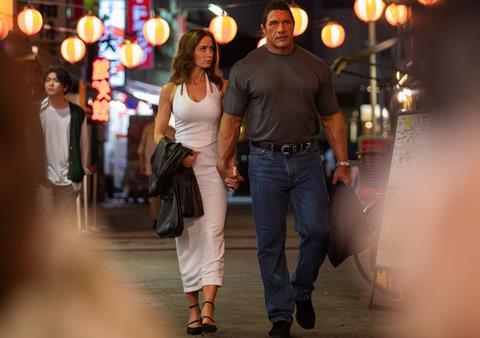Benny Safdie’s first solo directorial work is based on real life wrestler Mark Kerr. It premieres in Venice competition

Dir/scr: Benny Safdie. US. 2025. 123mins
Sports films are often about a character who overcomes the odds to win the big match. But Benny Safdie’s solo directorial debut is concerned with something more rare: a fighter learning how to lose. Based on the life of Mark Kerr, a prominent UFC figure of the 1990s, The Smashing Machine may not always transcend genre conventions, but is a consistently idiosyncratic and candid look at a working-class athlete with a complicated romantic relationship and a crippling opioid addiction. Despite his hulking physique, Dwayne Johnson plays Kerr with real vulnerability as his championship aspirations slip away.
Grittier and more intimate than is typical for the genre
The Smashing Machine premieres in competition in Venice before screening in Toronto and will open in the UK and US on October 3, hoping to garner awards consideration for Johnson’s change-of-pace dramatic role. (He is joined by his Jungle Cruise co-star Emily Blunt.) Arthouse audiences will surely be curious to see what Safdie does on his own after co-directing acclaimed films such as Good Time and Uncut Gems with his brother Josh (whose own solo effort, Timothee Chalamet comedy Marty Supreme, is due for release in December.)
Set between 1997 and 2000, the film introduces us to Kerr (Johnson), a former college wrestling star who is now part of a new niche sport known as Ultimate Fighting Championship (UFC). Kerr has never lost a professional match, but the paydays are not lucrative and he often has to travel to Japan for tournaments. Involved in a stormy but longterm relationship with girlfriend Dawn (Blunt), he wants to keep his winning streak alive. After a controversial bout in which his opponent was not penalised for illegal strikes, leading to a no-contest ruling, Kerr begins spiralling, turning increasingly to the opiates that help dull his physical (and emotional) pain.
Safdie is less interested in Kerr’s matches than he is in the fighter’s personal life. Much of the film centres on Kerr and Dawn, revealing how often they bring out the worst in one another. Both characters can be self-involved, unable to hear their partner’s point of view during an argument, and Safdie occasionally lets the disagreements become volcanic. While the film lacks the grand psychological depth of Raging Bull’s scenes of domestic drama, Kerr’s romantic woes nonetheless consume him in a picture that largely avoids sports tropes such as training montages and high-profile title bouts.
Similarly, the film treats Kerr’s drug addiction with an unromantic matter-of-factness, sidestepping many of the usual treacley plot points involving rehab and recovery. Johnson is especially touching when portraying this outwardly macho individual who breaks down in tears at his inability to pull himself out of his dependency.
During the UFC matches, Johnson’s former wrestling career ensures an immediate authenticity, although Safdie shoots the bouts with a minimum of flair. These intentionally unshowy fights highlight UFC’s lack of high-wattage glitz at this early stage in its development, and its forgotten blue-collar participants, whereas now the sport is massively popular and its stars practically household names. Johnson’s performance, enhanced by Kazu Hiro’s convincing prosthetic makeup, is appropriately stripped-down, underplaying the gregarious charisma he usually exudes.
But as strong as Johnson’s turn is, Blunt has the more demanding role. Dawn is an unapologetically difficult, often insensitive person, so it falls on the actress to add shading to the character. The two leads have a tempestuous chemistry, so we understand why Kerr and Dawn are crazy about one another — and why they frequently drive each other crazy. Sadly, Safdie doesn’t always make their square-offs a fair fight, occasionally demonising Dawn, but Blunt is firmly in her character’s corner, hinting at her own dark psychology.
Near its conclusion, The Smashing Machine eventually succumbs to a predictable storyline in which Kerr, now off opioids, must rise from the ashes and prove himself in the ring. If that wasn’t familiar enough, he also may have to compete against his best friend Mark, played by actual MMA fighter Ryan Bader. Those sops to conventional filmmaking disappoint, but even here Safdie does his best to craft something grittier and more intimate than is typical for the genre. Themes of ageing, failure and resignation drive The Smashing Machine, which is suitably modest and minor-key in keeping with its little-known but compelling main character.
Production companies: Out for the Count, Seven Bucks, Magnetic Fields
International sales: A24, international@a24films.com
Producers: Benny Safdie, Dwayne Johnson, Eli Bush, Hiram Garcia, Dany Garcia, David Koplan
Cinematography: Maceo Bishop
Production design: James Chinlund
Editing: Benny Safdie
Music: Nala Sinephro
Main cast: Dwayne Johnson, Emily Blunt, Ryan Bader, Bas Rutten, Oleksandr Usyk























